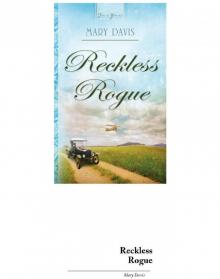- Home
- Davis, Mary
Uncertain Alliance
Uncertain Alliance Read online
Copyright
ISBN 1-59789-901-7
Copyright © 2008 by Mary Davis. All rights reserved. Except for use in any review, the reproduction or utilization of this work in whole or in part in any form by any electronic, mechanical, or other means, now known or hereafter invented, is forbidden without the permission of Truly Yours, an imprint of Barbour Publishing, Inc., PO Box 721, Uhrichsville, Ohio 44683.
All scripture quotations are taken from the King James Version of the Bible.
All of the characters and events in this book are fictitious. Any resemblance to actual persons, living or dead, or to actual events is purely coincidental.
Our mission is to publish and distribute inspirational products offering exceptional value and biblical encouragement to the masses.
PRINTED IN THE U.S.A.
One
Seattle, January 1895
“Straight to school. Do you hear me?” Alice Dempsey planted her hands on her slim hips and narrowed her eyes at her eleven-year-old brother, Burl.
“Why do I gotta go anyway? Mr. Kray don’t know nothin’.” Burl’s shaggy blond hair stuck out in odd places.
“Mr. Kray doesn’t know anything. And you obviously don’t know everything.”
“I already know everything he knows. He ain’t worth shucks. He’s an ignorant ol’ coot.” Burl jammed his hands into the pockets of his patched pants.
“That’s enough of that kind of talk. He was smart enough to stick with his schooling.” She tried to smooth down his cowlick with her hand.
He ducked out of her reach. “Why can’t I just stay home with Grandpa?”
“Schooling is important.” She didn’t want Burl to end up spending the rest of his life in a dirty, overpriced, overcrowded apartment. He deserved a place to run and play. She turned to their grandfather, who sat at the rickety square table. “Talk to him.”
Grandpa turned his sternest look on Burl. “Do as your sister says. I wish I would’ve had an opportunity to go to school.”
Burl got a twinkle in his blue eyes. “You go in my place. Tell Mr. Kray you’re me. He’d probably believe it, too. He’s that stupid.”
Grandpa narrowed his green eyes. “Put on your shoes and skedaddle, young man.” Then he coughed several times, hard.
She worried over Grandpa. The medicine she’d spent the last of her money on didn’t seem to be helping so far. And his heart wasn’t very strong. She needed him. He was her rock, her anchor.
Burl gave in but muttered through the whole process about its being a waste of time. When he stood, three-year-old Miles held his hands up to him. Burl picked him up. “Hey, squirt, your time’s a comin’. Your mean ole ma’s gonna make you go to school, too.”
Alice took Miles, setting him on her hip, and handed Burl his lunch pail with only a boiled potato and a bread crust to satisfy his hunger. He was too thin. “Straight to school.”
He let out a long burp.
“Burl, mind your manners.”
He nodded then grinned, heading for the apartment door.
She watched him walk down the hall. He was growing so tall, almost as tall as her at five foot five inches. His voice had begun to crack when he spoke. The first of many steps to becoming a man.
When he turned to go down the stairs, she could see his mouth flapping open and closed, but no words were coming out. Still a boy. She wished he wouldn’t mock her when he thought she wasn’t looking, but as long as he went to school, she’d overlook it. She understood his desire to contribute to the family. She was providing fine for them right now. The day would come soon enough when he would need to work as well, but for now, she wanted him to get as much schooling as possible. At least finish this school year.
She shut the door and turned to Grandpa. “Thanks for helping with Burl.”
“He’s right, you know.”
“Please don’t start.” She set Miles in a chair to eat his oatmeal.
“He is smarter than Mr. Kray. But you’re right, too. He should be in school as long as he can. He needs a strong hand. I wish I were more help to you instead of one more burden.” Grandpa held up his stump arm that ended just below his elbow.
She knelt beside Grandpa’s chair. “You are not a burden.”
He touched her cheek. “I wish you had someone to take care of you.”
“The four of us are doing just fine.” She hadn’t done so well choosing a husband for herself though. “Will you be fine with Miles?”
“You ask me that every day. I near on raised your ma by myself. I daresay we’ll manage.” Grandpa patted her hand.
“I worry about you.”
“I know you do. I worry about you, too.”
“You look so tired all the time.” Maybe she should let Burl stay home and help Grandpa.
Grandpa tapped his chest. “This old body don’t sleep like it used to.”
“It doesn’t help that you can’t nap during the day.” She glanced at her very active three-year-old son.
“I’d sleep better at night if you had someone to look after you.” His green gaze bore into her.
“I don’t want you wearing yourself out worrying over me. I need you. I can’t do all this by myself.” She glanced around their meager two-room flat.
“I know. That’s why I worry and why you need a husband.” Grandpa unfolded the newspaper on the table in front of him.
“Grandpa, don’t even suggest it. Oscar turned out to be my worst decision ever. Nothing good came of it.” She ruffled Miles’s wad of curly blond hair. “Except for him, of course.” Looking back, she could tell that she’d been sad and still mourning the loss of her ma two months earlier. Oscar had probably sensed her vulnerability.
“Just be picking more carefully this time.”
There wasn’t going to be a this time or a next time. She swung on her shawl then kissed Grandpa on the cheek. “Don’t overdo it today.” She shook her finger at him.
“Don’t be pointing at me, young lady.”
She tucked her finger away and straightened her back. Young lady indeed. She wasn’t even twenty-two and already felt eighty. She kissed Miles on the head. “You be good for Grandpa.”
Miles smiled up at her. “I be dood.”
“I don’t know why they bother printing the tide schedule anymore.” Grandpa had turned to his newspaper. “With the streets raised, people can flush their toilet anytime they like.” Poor Grandpa. He was left to reading newspapers that were several days old. But he never complained. He liked to read it as though it was today’s. He’d learned to read as an adult when her ma had learned. In the evenings, he’d ask her everything she learned in school. He’d take it all in without letting on to his young daughter that he was learning from her.
“People like to know the tide schedule for more than just plumbing utility.” There had been plans to raise the city streets to correct the plumbing issues that rose with the tide twice daily, but six years ago, a poor Swedish cabinet employee inadvertently started a fire that burned thirty city blocks. He became a hero. The ugly haphazard town had a chance to rebuild itself into a cleaner, more refined city. The plans to raise the streets were all the talk, but the business owners didn’t trust the city planners to get the job completed quickly; they rebuilt their businesses of brick and stone, knowing the streets would be raised around them in the near future.
“Look at this.” He pointed to the open page. “Another poor drunk fell off the street. Fortunately, it was one with a short drop. Broke both ankles, his arm, his collarbone, and gave himself a concussion.”
The city had been slow in raising the streets and even slower in constructing the sidewalks from the street to the front of the buildings. Not all the sidewalks were finished. “Serves him right fo
r taking the devil’s drink.”
“Now, Alice, that’s not very charitable.”
“Oscar drank, gambled, and the Lord only knows what else with what little money we had. Left us with nothing. I have no tolerance for a man who drinks.” The mention of Oscar caused all sorts of feelings to rise in her; anger and hurt at his lies and deception, longing for what she thought they’d had, and regret for Miles’s not having a good father to help raise him to become an upstanding man.
Grandpa turned back to his paper.
“I need to skedaddle, too, or I’ll be late.” She took one last pensive look at Grandpa and headed out the door. She crossed the muddy street and headed for the schoolhouse. Burl was skipping rocks on an oversized puddle in the schoolyard. One worry down. She headed up the street and toward downtown. Cold water and mud seeped through the crack in the side of her boot, soaking her stocking. At least the rain from last night had stopped, or she’d be soaked from head to toe.
She walked up the incline of the first paved street of her trek and tried to shake off as much mud from her boots as possible. Then she came to the first raised street. She looked to the sidewalk fifteen feet below. It would be faster to stay up above, but she didn’t want to have the same fate as the man in the paper. Even sober people could fall to their demise. She went to the corner and climbed down the hastily constructed wooden stairs to the boardwalk below. The stairs had been built as a temporary measure to get up and down from the street. Above her, five-foot-wide bridges connected the street to the second-floor doorways. She walked the block and greeted a couple of store owners who were just beginning to open up. Half of the first floors on the edge of the reconstruction didn’t have any businesses in them but were used for storage. Others housed businesses of ill repute and were open under the cover of darkness. Many claimed to have an abundance of seamstresses, but word had it that not so much as a single threaded needle could be found on their premises. She needed to hurry along so she wouldn’t be late. She didn’t want to give her boss any excuse to fire her. She was already on slippery mud with the woman.
Up one rickety staircase and down another and up again. If the sidewalks weren’t completed soon, the staircases would need to be replaced. Once above ground again, she could cross the street and round one of the blocks that had overhead sidewalks. It was a wonder that they had raised the streets around the buildings and were now constructing sidewalks from the street to the buildings. She descended sturdy paved stairs on a side street and through a doorway to the sidewalk below. As she approached the corner, she looked up at the checkered glass skylight in the sidewalk above. Even on a cloudy day, the skylights poured light onto the walkways below. When she rounded the corner, she wanted to turn back. Ian MacGregor was washing the front windows of his pharmacy next door to the millinery where she worked. She would be late if she waited until he was finished.
She used to come early to be able to talk with him for a few minutes. He was kind and always had a gentle word. As of late she’d sensed that maybe his friendship toward her was becoming something more. The last thing she wanted to do was encourage feelings on his side. He stood on a ladder to reach the tops of the windows. She dipped her head and continued past the bookshop, the hair salon, shoe repair store, and pharmacy to the millinery, hoping he would be too busy to take notice of her.
As she passed by, he turned. “Good day, Miss Dempsey.”
It was missus, but she’d never bothered to correct him. Also, she liked to ignore that one bit of poor judgment in her life. “Good day, Mr. MacGregor.”
“You are looking well today.” He gazed at her with a look that said more than his words.
She caught the hint of his Scottish brogue. She wanted to ask him about it but didn’t want to be so forward. “As are you.” She ducked into the millinery before a part of her decided to bask in his kindness and warm brown eyes.
❧
Ian MacGregor stared at Tilly’s Millinery shop door. Alice had slipped away. Again. He’d hoped she’d get to work early so they could talk as they once had, but of late she’d been getting to work just in time for opening.
The bell over his own shop’s door jingled, and Conner Jackson stepped out.
Ian had hired Conner the day he’d rented his underground store space. Conner had been inquiring about employment from Mr. Lansky upstairs, who owned the building. Ian had felt a connection to Conner from the first moment and had prayed on the spot, and the Lord had led him to offer the younger man a job. By the end of that week, Conner had moved his few belongings into the back of the pharmacy, appreciative of a place to stay. Conner had quickly become his best friend in the new city Ian was calling home. The Lord had given Ian a fresh start.
Conner looked toward the millinery. “Did you get to talk to her?”
He climbed down off the ladder. “Who?”
“Who indeed?” Conner took the bucket of water. “I doubt the windows have gotten dirty since you washed them yesterday. If you aren’t washing the windows, you’re sweeping the boardwalk or checking your sign or whatever it is you do when you’re standing out here doing nothing, looking at the storefront.”
“Am I that obvious?” He folded the ladder.
Conner held the door and followed him inside. “To me you are. I don’t think Miss Dempsey has noticed.”
“She’s not likely to notice the likes of me.” He put the ladder in the storage room.
Conner dumped the nearly clean water down the drain. “Why do you say that?”
“Look at me, Conner. I’m not a handsome dude like you. I’m barely five foot and six inches. Ladies prefer men like you who are tall and lean. And certainly a young lady as beautiful as Alice would want a man who is more than an inch taller than her.” He looked up at Conner. His pent-up frustration came out in a deep breath. “When I’m standing next to you, no lady would even notice I was there.” He ran a hand over his thinning sandy hair. It had nothing distinguishing about it. It was about as appealing as the mud puddles after the rain. Not at all like Alice’s. Hers was a beautiful pale blond, almost white like an angel’s. And he suspected it was wavy, too, by the looks of the curly tendrils around her face.
“You have a lot to offer a lady.” Conner gripped his shoulder. “Once she gets to know you, she’ll see that.”
He’d like to believe that. “I’ve learned that beautiful women have only one interest when it comes to me.”
“What’s that?” Conner put the bucket under the sink and pulled out a box of rags.
He patted his breast pocket. “My wallet.”
“You aren’t giving Miss Dempsey much credit. She seems like a hardworking young lady. The kind who makes her own way in this world.”
“So it seems.”
Conner dug in the rags and pulled out the metal cash box. He handed it to Ian. “If Miss Dempsey was after money, why would she be working at a shop underground?”
He couldn’t answer that. “She’s playing on my sympathies?”
“The way you talk, she can’t even see you.” Conner cocked one eyebrow. “If you’re so determined to think she’s after money, why stay sweet on her?”
“I don’t think she is after money yet. But if she were to turn her attention toward me, what other reason could it be but money?”
Conner shook his head. “You are hopeless. Who put you in such a foul mood on ladies?”
Ian headed for the front of the store and opened the cash register. “Before I came out here a year ago and opened shop, I was engaged to a beautiful woman.” He made sure he was looking away from Conner when he made this confession. He didn’t want to see the shocked look on Conner’s face.
“Obviously she only wanted money.” Conner didn’t sound shocked, so he looked back at him.
“It wasn’t just the money; it was what she wanted it for.”
Conner waggled his head back and forth. “I can’t even imagine.”
He slowly counted the money into the drawer. “Charity.”
He straightened the bills and coins. “There was a certain wealthy gentleman, who was handsome to boot, intimately involved with this charity. She wanted him to take notice of her. She used my money to gain his attention.”
“Ouch.”
“They are happily married now and, as I hear it, expecting their first child.” He closed the drawer harder than need be.
Conner was silent for a moment. “I don’t think Miss Dempsey is like that. If she were after money, she’d be up there.” He pointed up toward the street level. “She would have no trouble finding half a dozen men to buy her fine things.”
“I didn’t think Azalea was like that either, obviously.”
“So what’s Miss Dempsey’s story?”
He went to the door and rolled up the shade, signifying they were open. “I haven’t been bold enough to ask her. I don’t want her to think I’m prying.”
Conner leaned on the shelf behind the counter and folded his arms. “So you have no idea if her parents would even approve of you courting their daughter?”
“I have no idea if she even lives with her parents. She seems so independent and never mentioned them. For all I know, she has a beau or husband.” He hoped not.
“No men come by the millinery calling on her, and there doesn’t seem to be a man buying her expensive clothes. So what have you spoken to her about?”
“I tell her she is looking well. One of us will mention the weather, the other how the construction on the streets and boardwalk is progressing. She’s very intelligent.”
Conner pushed off the shelf. “That’s it? In all these weeks of standing out front making yourself busy?”
“Oh no. We’ve conversed on the feud between the Dennys and the other founding fathers. And on Doc Maynard.”
Conner stared at him like he’d just told him he was going to invite a grizzly bear home for dinner. “Have either of you ever spoken about yourselves?”
He shook his head. “I’m not bold with ladies as you are. I don’t know what to say.”
“I wouldn’t say I’m bold around ladies, but I can talk to them. Miss Dempsey is a person. Just talk to her like you do me.”

 Lakeside
Lakeside Cinda's Surprise
Cinda's Surprise Heritage
Heritage Uncertain Alliance
Uncertain Alliance Reckless Rogue
Reckless Rogue Roger's Return
Roger's Return